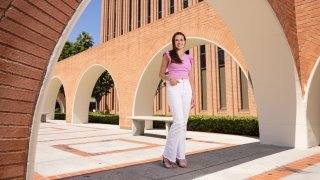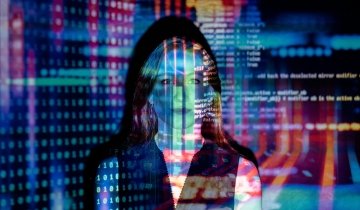From as early as prekindergarten, at the age of 5, Caraline Rossini knew she was different from everyone else. Growing up in Bothell, Wash., she frequently grappled with academic tasks that appeared effortless to others, leaving her thinking: “Why is this so hard for me? It’s not fair.”
Activities such as reading aloud in class were particularly daunting for Rossini, often accompanied by anxiety and shame. It was only after her later diagnosis that the cause became clear: Dyslexia slowed her reading speed, while a language processing disorder significantly delayed her ability to understand and absorb new information.
For years, Rossini felt uniquely burdened by her educational challenges. It was not until she enrolled at Seattle Pacific University, where she met others with similar learning profiles, that she experienced a deep sense of relief and belonging. She was not alone.
With this empowering realization, Rossini developed learning strategies tailored to her strengths and needs, such as meticulous note-taking, crafting detailed study guides, and utilizing alternative format textbooks and study-tool software like Glean. These adjustments helped her flourish. Rossini rode this wave of self-acceptance into a career in educational counseling—a career she initially learned about in a psychology seminar her senior year.
After graduating from Seattle Pacific University with her BA in psychology, Rossini applied to USC Rossier’s Master of Education in Educational Counseling program. At USC Rossier, Rossini’s educational and professional journeys have been intrinsically connected to her personal experiences with dyslexia and language processing disorder. These learning differences have not only shaped her academic and career paths but also fueled her desire to provide the support she once lacked.
Reflecting on her own feelings of isolation and misunderstanding before connecting with peers in college, Rossini recalls “desperately wishing I had someone my age who was going through the same things.” She has now become that guiding star for her community, ensuring no student feels alone by providing encouragement and understanding to those facing challenges like her own.
“My personal experience with academics is why I chose this field,” Rossini says, citing that pivotal moment in her senior year psychology seminar and an internship working with neurodivergent students that helped reveal her career path. “I was like, ‘Oh, my gosh, this is my purpose.’”
In her professional life, Rossini has become a champion of the students she supports at Long Beach City College’s Career Center, where she interns as a student success coach. In her role, Rossini emphasizes the importance of self-advocacy, encouraging students to clearly articulate their needs and collaborate with educators to craft their path to success.
Rossini’s story culminates in a compelling testament to the power of resilience and self-awareness. She recounts being “told by society and several teachers that my learning disabilities would prevent me from becoming successful,” despite all her best efforts. But “little did they know, them planting that seed was the fuel I needed to light my soul on fire and prove to everyone, including myself, that I can do anything.”
While she misses the lush landscapes of Washington, Rossini admits she has fallen in love with the sunshine and plans to stay in Southern California after graduation. She ultimately aspires to become a community college counselor and teach as an adjunct professor. She remains open to other opportunities in higher education, as long as she can continue her work with students. “That’s what really brings me joy at the end of the day,” Rossini says.
Rossini’s journey underscores a profound narrative: Adversity, when embraced, can become a catalyst for growth and an avenue to inspire others. She now considers her dyslexia and learning processing disorder not as barriers but as empowering distinctions, affirming, “My diagnoses are my superpower.”




